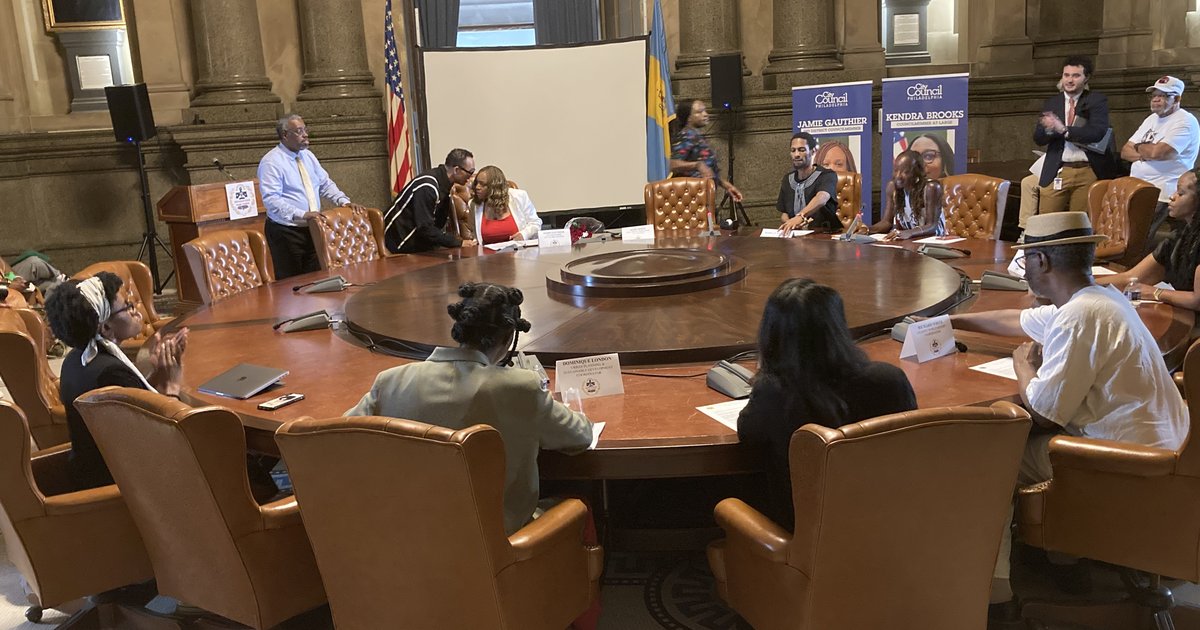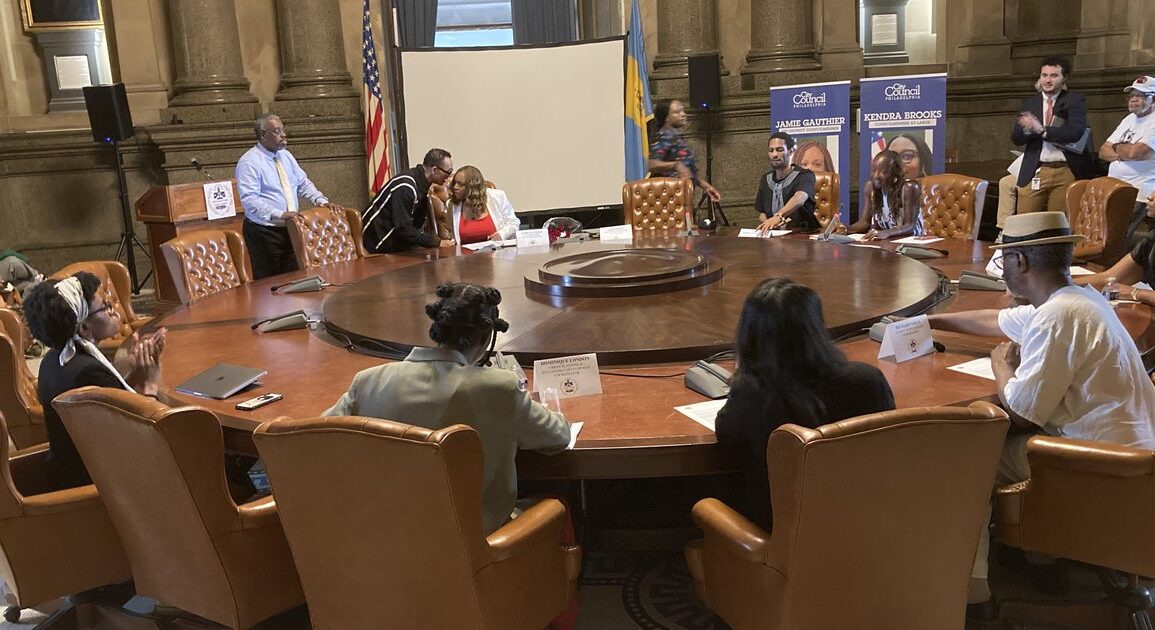
The nine volunteers who will steer the Philadelphia Reparations Task Force were introduced by City Council on Tuesday afternoon, beginning a process that will examine how the city might compensate Black residents who are descendants of enslaved people.
Last year, Philadelphia joined a growing number of U.S. cities considering ways to atone for historical injustices that stem from the legacy of slavery, the Jim Crow era and various forms of institutional racism that continue to disadvantage Black residents today.
Councilmembers Jamie Gauthier and Kendra Brooks, who have led the creation of the task force, say Philadelphia must confront uncomfortable truths about how present-day poverty and health disparities trace back to generational harms.
“Until we look into our past with the determination to uncover the entire truth — no matter how ugly or scary that truth may be — our nation’s original sin will continue to toxify the present and future,” Gauthier said.
The purpose of the task force is to research multiple areas of need in Philadelphia’s Black community and gather public feedback about how the city’s resources can best be used to help people overcome barriers to economic advancement.
“Whether it would take the form of cash, whether it would take the form of land, we’re open to it,” Gauthier said.
Ahead of a first listening session Tuesday, two co-chairs and seven coordinators were introduced as the leaders of the task force. Applicants were required to be “descendants of enslaved Africans in the United States, the descendants of Black, Negro, or Colored Americans since 1865, and/or the descendants of Freedmen emancipated from slavery,” the city said in November. Task force members also had to be Philadelphia residents for at least 10 years and possess experience in the realms of activism, social justice or community organizing.
The task force members and their roles are listed below:
• Rashaun Williams, Co-Chair. Williams has worked as an environmental sustainability organizer who co-chairs the Philadelphia Chapter of the National Coalition of Blacks for Reparations in America.
• Breanna Moore, Co-Chair. Moore is a Ph.D. history candidate at the University of Pennsylvania and also is a research fellow at the New Jersey Reparations Council.
•Ayanna Stephens, Education Coordinator. Stephens is the principal of the Workshop School, a project-based high school in West Philly.
• Kevin Mansa, Justice Coordinator. Mansa is a financial professional, community advocate and entrepreneur who works to improve financial literacy.
• Cara McClellan, Criminal & Legal Justice System Coordinator. McClellan is the founding director and practice associate professor of Penn Carey Law School’s Advocacy for Racial and Civil Justice Clinic.
• Jourdan Lawrence, Health & Wellness Coordinator. Lawrence is an assistant professor of epidemiology and biostatistics at Drexel University’s Dornsife School of Public Health.
• Dominique London, Urban Planning & Sustainable Development Coordinator. London is a multi-disciplinary artist and community organizer in West Philly.
• Jackie Newsome, Law & Policy Coordinator. Newsome is an attorney and theologian who has expertise in the intersection of faith and law.
• Richard White, Atlantic World History Coordinator. White is a Black history researcher with the Pan African Federation Organization.
U.S. public opinion about the concept of reparations is divided along racial lines, according to a Reuters/Ipsos survey conducted last year. The survey found 74% of Black Americans support the U.S. government providing some form of reparations for slavery and its legacy, compared with just 26% of white Americans. Among Democrats, 58% said they support reparations versus 18% of Republicans who support the idea.
“The root word of reparation is repair, so repair may look different to every individual and every family,” said Williams, the task force co-chair.
The task force will study how resources can be used in multiple areas — housing, the health sector, urban planning, criminal justice and education. There will be a series of public engagement sessions, surveys and other opportunities for the community to get involved. Members of the task force will then produce a report with a series of recommendations about how to implement a reparations program that serves the needs of Black Philadelphians.
“Philadelphia is the city where American democracy was established,” said McClellan, the criminal and legal justice system coordinator. “Unfortunately, Philadelphia is also shaped by the legacy of slavery and its afterlife, including mass incarceration, redlining, and educational apartheid. The work of reparations in Philadelphia is therefore crucial to ensuring truth, reconciliation and the repair of democratic principles.”
Several task force members mentioned the possibility of reparations including a guaranteed income program. Philadelphia is participating in a federally funded program that gives low-income parents $500 monthly as part of a study to see how direct cash assistance benefits families in need. The task force will consider, among other ideas, how cash assistance could be expanded in the city.
There’s no definite timeline for the task force to produce its report and no target date for a reparations program to begin in the city. Gauthier said those questions will be up to the task force to determine.
Getting reparations programs off the ground has been a challenge in other cities and states.
In Boston, a city-appointed reparations task force recently missed a deadline to publish a report on its recommendations amid calls from some community groups to allow more public engagement. California’s statewide reparations task force had been at work for more than two years and made more than 100 recommendations before the group was dissolved last year. A city task force in San Francisco proposed giving qualifying Black residents large lump sums of up to $5 million each and annual salaries of $97,000 as a form of reparation, but so far the city has only offered a formal apology for its role in driving systemic racial discrimination. San Francisco’s Democratic mayor later slashed the task force’s budget as part of a wider set of municipal cost-cutting measures.
At the federal level, where some argue a broader reparations program should originate instead of in states and cities, ongoing attempts to create a reparations commission have been stalled in Congress for decades.
Evanston, Illinois, is the only city in the country with an active reparations program providing compensation to Black residents. The heavily Democratic city outside Chicago raised the first round of money for the program by taxing local marijuana sales. So far, Evanston has made payments of up to $25,000 to 16 qualifying Black residents who were selected through a lottery system The city’s program has been criticized for some of its requirements, including the need to own a home or plan to purchase one to be eligible. Evanston officials plan to expand the city’s reparations program this year.
Councilmember Brooks said she believes it’s Philadelphia’s responsibility to come up with a program that can invest in areas where there are obvious needs holding Black residents back.
“We see the lasting impact of racism in all corners of our city, and we know that cycles of poverty and violence will continue to repeat themselves until we address the root causes of harm in our communities, from lack of housing to underfunded schools,” Brooks said.



